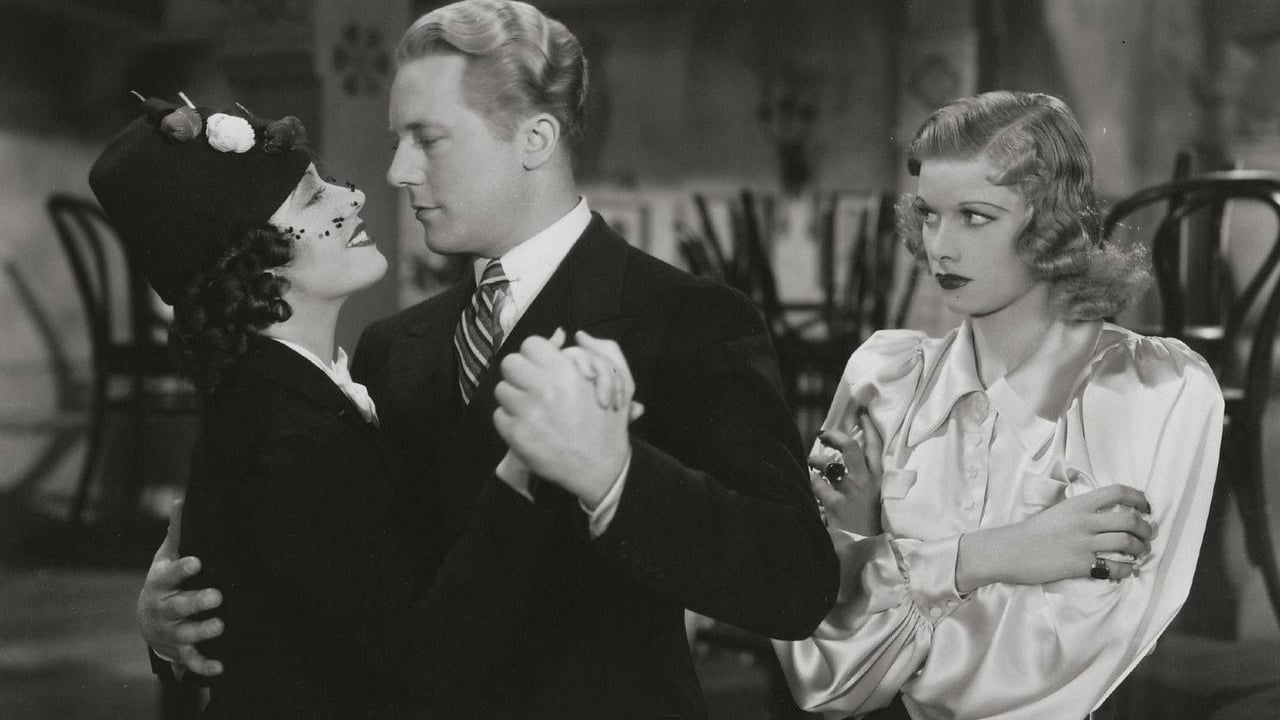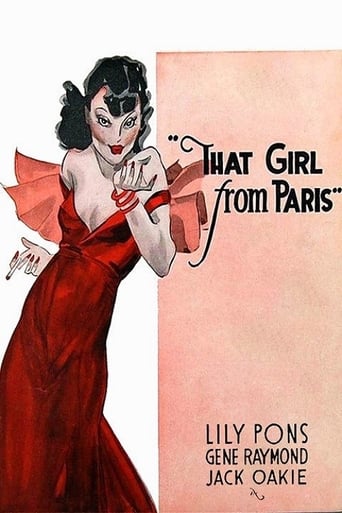

What works in this movie is the comedy of the four men - and, in her soapy dance number, of Lucile Ball. Both when they play swing and when they crack jokes, they're funny.What doesn't work, too often, is the star of the movie, Met coloratura soprano Lily Pons. I enjoy Pons' operatic recordings, and have most of them, but she doesn't work well in this movie. She had neither the personality nor - to be honest - the looks of Jeannette MacDonald or Grace Moore, and at this point she was still having real problems with the English language. A comedy with a lead who isn't good with the language is a real problem. Contrast her with Herman Bing, who misused English to comic effect, and you see the difference. She was no dancer, at least in this movie, either. Her one real talent, that for which she was famous at the Met, was her high notes.That causes problems in a movie made for a general audience. She is too often given music to show off her very high notes and her staccati. At the Met audiences appreciate that sort of thing, but it seems misplaced in what was meant to be a general audience movie. She should have been given more lyrical music, less fireworks. Think of Jeannette MacDonald singing "San Francisco" in the movie of the same name, which came out the year before, or Grace Moore singing "Ciriciribin" - much less "Minnie the Moocher".It's interesting to see how she performs "Una voce poco fa" in her Met Opera scene. If that's how she did the role on state, she was not much of an actress even by the operatic standards of her day.This movie could also have used a better director, to make the comedy scenes even better, or perhaps to have helped Pons do a better job.But the basic problem is that Pons was not movie material, at least not for this sort of general audience comedy. She doesn't sink the picture, but she doesn't add anything positive to it, either.Footnote: The year after making this picture, the male lead, Gene Raymond, would marry Jeannette MacDonald, another lyric coloratura who was much better suited to the movies, and much better presented there.
... View MoreIf That Girl From Paris was made today there would be protesters at the screenings as Lily Pons is quite the illegal alien. I could just see the Donald leading a picket line protesting the fact that the heroine is a woman who stows away on ship to come to America and then is ready to get a marriage of convenience to stay here.Not liking the arranged marriage she's been hammerlocked into Lily hooks up with a touring swing band consisting of Gene Raymond, Mischa Auer, Frank Jenks, and Jack Oakie. Of course all that doesn't sit well with Lucille Ball, affianced to Raymond and getting some of the best lines in the film.Pons has some good numbers in all genres of music including a swing version of the Blue Danube Waltz and highlighting with her character's Metropolitan Opera debut in the Barber Of Seville. This film was made right after Grace Moore scored such a success in One Night Of Love for Columbia Pictures. Studios went out and signed up opera singers, Lily Pons was RKO's catch. The vogue came and went quickly, this was Lily's second feature film after I Dream Too Much. She would do one more Hitting A New High and then she would return to the Metropolitan Opera for real.But I'm glad some of these voices like Lily Pons recorded their art for posterity in films like That Girl From Paris.
... View MoreI wish I had a time machine and could go back to the old Met and hear some of these singers like Galli-Curci and Lily Pons, who had voices the size of gnats. Nowadays a straight coloratura would never be given Violetta to sing. I'm not even sure one would sing Lucia. They still sing Gilda, and by Act II, it looks like a silent movie. as no one can hear them.Anyway, Lily Pons was a huge international breakout opera star who made three films for RKO in the '30s. She also did advertisements and gave concerts. Here, she plays a singer, Nikki Martin, a Parisian without a passport who takes off on her wedding day and winds up meeting musician Windy McLean (Gene Raymond) who plays with a band, the 'McLean Wildcats.' Nikki falls for him and stows away on the ship that takes him and his band back to America. Authorities find her, lock her up, and fire the band, which was supposed to play on the ship. Nikki escapes once the ship reaches New York and turns up at the Wildcats' apartment.Windy's girlfriend, Clair (Lucille Ball) arrives and has a job for them at a roadhouse, which gets them out of town and away from the authorities, who want to bring them to justice for hiding Nikki. When Clair is injured, Nikki becomes very popular as the band's singer. Clair reports them, and soon, they're on the run again.The band players (Jack Oakie, Hermann Bing, and Mischa Auer) are funny and lively. The film contains lots of music of all kinds. At the end, Pons sings one of her signature roles, Rosina in "The Barber of Seville." Today that role is sung by a mezzo-soprano.Pons had excellent coloratura technique (but no trill) and, like most female singers of that era, backed off the high notes. It has to do with their training and the type of sound that was considered acceptable. She had a high F and was known for Lakme, an opera which isn't done much anymore.This is an entertaining film that gives one a chance to see one a really big opera star of the day, during a time when opera was much more a part of the culture. Pons sang into her seventies and, even when I was a child, was still very well known.
... View MoreIt does have one scene of note. Pons plays an opera singer hiding out with a jazz band. The band knows nothing of her identity. She sabotages their singer (Lucille Ball in an early role) and is forced to go on stage as a substitute. Well, she only knows opera; the band only knows jazz. She sings "The Blue Danube" with both her and the band segueing from classical singing to jazz and back. It's a really delightful number, very inventive. If the movie is ever on TCM or AMC, it's work a look just for that
... View More